“Hearts on Fire: Six Years that Changed Canadian Music, 2000-2005,” the Latest Addition to My CANRock Library
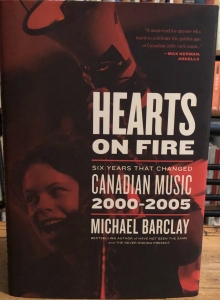 Really excited to have my hands on a copy of HEARTS ON FIRE: Six Years that Changed Canadian Music, 2000-2005 by Michael Barclay, the latest book in an ongoing series of in-depth histories of independent Canadian rock and folk music. It examines the rise of a couple dozen Canadian bands who broke lots of new artistic and sonic ground—and while sharing few commonalities apart from the fact they largely or partly hailed from Canada—put the Canadian music scene on the global map in a new way in the first decade of this millennium.
Really excited to have my hands on a copy of HEARTS ON FIRE: Six Years that Changed Canadian Music, 2000-2005 by Michael Barclay, the latest book in an ongoing series of in-depth histories of independent Canadian rock and folk music. It examines the rise of a couple dozen Canadian bands who broke lots of new artistic and sonic ground—and while sharing few commonalities apart from the fact they largely or partly hailed from Canada—put the Canadian music scene on the global map in a new way in the first decade of this millennium.
The bands and solo artists in the new book represent wide swathes of indie music from Canada: anthemic, quasi-orchestral rock, with Arcade Fire*, Broken Social Scene, Stars, Metric, Owen Pallett, and The New Pornographers; country rock roots-folk sounds with The Sadies and Blue Rodeo, and singer-songwriters Sarah Harmer, Kathleen Edwards, Hawksley Workman, Feist, and Joel Plaskett; headbangers are not overlooked with Constantines, Danko Jones, Black Mountain, and Fucked Up. And The Hidden Cameras, God Speed You Black Emperor, Hot Hot Heat, Peaches, Sam Roberts Band, Royal City, Wolf Parade, The Dears, Tegan and Sara, and AlexisonFire, also appear. A lot of artists whose music I knew already, and a number of others I’m glad to discover.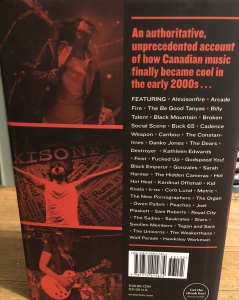
It’s the latest installment in what amounts to a publishing rarity—a nonfiction trilogy**, though I’m pretty sure the three authors involved, Barclay, Ian A.D. Jack, and Jason Schneider, didn’t envision it as such when they published HAVE NOT BEEN THE SAME: The CANROCK Renaissance 1985-1995 (HNBTS) in 2001; it was very well received by fans and musicians alike, which led to an expanded version in 2011. That’s when I first became aware of the book.
A prefatory note in the second edition explained they’d begun working on the first version in the late 1990s, so collectively this enterprise has been going on now for parts of four decades. They’ve had the same publisher throughout, ECW Press. As an editor and literary agent myself I want add, to ECW’s credit, they have consistently put out well-designed and edited books, very readable volumes that do justice to the authors’ vision for their books.
I got my copy of the sturdily-bound 750-page trade paperback of HNBTS soon after my discovery, in 2009, of the dynamic Internet radio station CBCRadio 3, then a vibrant outpost for independent Canadian rock on the digital airwaves. It offered a passionate tribe of music lovers and fans dozens of hours of music every week. A cadre of talented hosts helmed the live programming with information, patter, contests, a new Track of the Day every weekday, brief interviews with musicians, and each day, a highly interactive blog featuring a Topic-of-the-Day with the hosts reading comments by contributors who minted memorable blog names for themselves. My handle was PSTNYC. According to the wiki on Radio 3, it “had its genesis [within CBC, Canada’s national broadcaster] in a late-1990s proposal to launch a radio network devoted to youth culture, comparable to BBC Radio 1 and Australia’s Triple J.” The station was supported by CBC for more than a decade, but poobahs there seemed to never quite understand the potential of it, even though the hosts—a lively group that included Craig Norris, Lana Gay, Vish Khanna, Amanda Putz, Lisa Christiansen, and Grant Lawrence, and musicians Tariq Hussain (a member of Brasstronaut) Graham Wright (of Tokyo Police Club), Jay Ferguson (from Sloan)—had loyal listeners for whom each host’s daily three-four hour show could be “appointment listening.” Sadly, live hosting was scuttled in 2015, and the station became little more than an algorithmic-driven entity. At its peak, the number of artists who created band profiles on the Radio 3 website and uploaded music to it numbered greater than 30,000. That’s a snapshot of just how active the music scene across Canada was, and is, a country whose population at the time hovered between 30-35 million. I attribute this, at least in part, to the prevalence of music education in Canadian schools. Radio 3 was a potent force for community-building which I still miss, as do the many dozens of friends in Canada and around the world I made in the course of the decade or so I was on the platform. Unfortunately, the website doesn’t even exist anymore as an archive of any sort.
I discovered HNBTS thanks to an album of songs by then-current bands covering songs by artists from the 1985-95 period which appeared in the first version of the book. It was organized, smartly, to promote the 2011 reissue. I heard those new version of older songs played on CBC Radio 3, and bought a digital download of it from Zunior.com, a digital musical seller that’s been a reliable source and supplier to me for many years. It’s operated by Dave Ulrich, a member of Inbreds, a band he played in with Mike O’Neill, included in HNBTS.
Around 2013, I started a companion to this blog called Honourary Canadian: Seeing Canada from Away, and have often written about Canadian indie music for both sites, attending shows by Canadian groups when their tours brought them into NYC. During this period, I also began attending the annual NXNE music festival in Toronto as press, and wrote many posts about the gathering for both of my sites. During the week of NXNE over five consecutive nights, I would hear upwards of four dozen groups at venues all across Toronto—the Horseshoe Tavern, Rivoli, Paddock, Danforth Hall, Dakota Tavern—hanging at the shows with friends from the CBC Radio 3 fan community. We would meet up for a picnic on the Saturday during the festival week, for which musicians would come to play under the trees—and in 2012, even in the trees—when Adrian Glynn and Zach Gray climbed this big beauty with their guitars to play for us.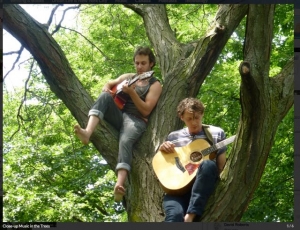
With three authors to cover the musical waterfront, HNBTS discussed dozens of artists and groups. Here’s a partial list: Stompin’ Tom Connors, Barenaked Ladies, NoMeansNo, the Nils, Rheostatics, Skydiggers, Bruce Cockburn, Hayden, Cowboy Junkies, k.d. lang, Jr. Gone Wild, Sloan, Eric’s Trip, Thrush Hermit, Sarah McLachlan, Blue Rodeo, Tragically Hip, Ron Sexsmith, New Pornographers, Shadowy Men on a Shadowy Planet, and the Weakerthans.
The second installment in this troika of titles to be published was WHISPERING PINES: The Northern Roots of American Music…from Hank Snow to The Band, in 2009, by Jason Schneider writing on his own. The narrative in this book actually begins earlier than the other two, in the 1950s with Canadian country music, by looking at the careers of Wilf Carter and Hank Snow. Radio played a key role in spreading their music, especially when American country singer Conway Twitty encouraged them to bring their music to the US. Later chapters cover Ronnie Hawkins (who just died yesterday) & the Hawks, Ian & Sylvia, Buffy Sainte-Marie, Gordon Lightfoot, Leonard Cohen, Joni Mitchell, Anne Murray, Bruce Cockburn, Kate & Anna McGarrigle, Murray McLauchlan, Neil Young, and The Band. Lest you think this all wouldn’t interest you, or would only cover unfamiliar bands, consider that the book’s meaty chapter on Hawkins, the Arkansas rockabilly pioneer, covers his hiring of the outfit comprised of Levon Helm, Robbie Robertson, Rick Danko, Garth Hudson, and Richard Manual. He dubbed them The Hawks, and of course, later they would be known as The Band. This is pure gold for people who like to read about Bob Dylan and The Band. Simply said, the book offers a superb narrative chronicling the influence of Canadian musicians on the growth of country-rock in North America.
Each of the three books employs a modified oral history approach, with lengthy interviews with musicians, and analysis of social factors, including consideration of what distinguishes Canada from the USA in the cultural realm. For a taste of the writing, see this paragraph from pg 58 of HNBTS of the instrumental trio the aforementioned Shadowy Men on a Shadowy Planet:
“Formed in 1984, Shadowy Men became one of Canada’s most beloved bands, known for their musicianship, eventful live shows, absurdist wit, and innovative visuals. They are best known around the world for providing music on the Kids in the Hall TV show, including its theme, “Having an Average Weekend.” Featuring Brian Connelly on guitar, Reid Diamond on bass, and Don Pyle on drums, the surf-influenced Shadowy sound was decidedly retro, but considerably more advanced than their peers. The Shadowy Men were extremely talented musicians and boasted underrated compositional skills as well, set to creative and extremely danceable grooves. They also attracted attention via their series of 7″ single between 1985 and 1988, featuring gimmicky packaging such as a game board or a Jiffy Pop container.”
A number of factors have combined to reduce my ardent involvement in Canadian indie music in recent years, beginning with the disappearance of CBC Radio 3, though my appreciation of the music continues unabated, and I still purchase and download music from Zunior.com, especially on their annual Boxing Day sale. During the pandemic I really enjoyed listening to the acoustic Mantle Concerts by my fave Canadian rocker, Matt Mays, still posted on youtube. Other factors in that diminishment included 1) the arrival of the Trump administration, whose border policies made it hard for Canadian musicians to enter the US, especially with their CDs and other merchandise that were always a key money-maker for them; 2) the advent of COVID-19, of course, with venues closed for much of the past three years; 3) and NXNE was downsized for a few years, but I’m happy to see it looks like it will be back at full strength this June, so perhaps I’ll make it up to Toronto for it in 2023. I would love to visit there again, and go back to such venues as The Cameron House, a homey spot where I’ve heard many great shows over the years.
As a closing note, here’s a picture of a shelf of music books in my home library, including a number of titles from my CANRock library. Reading from left to right: Special Deluxe and Waging Heavy Peace by Neil Young; The History of Rock N’ Roll in Canada by Bob Mersereau; Lives of the Poets (with Guitars): Thirteen Outsiders Who Changed Modern Music by Ray Robertson; I’m Your Man: The Life of Leonard Cohen by Sylvie Simmons; The Legendary Horseshoe Tavern by David McPherson; Whispering Pines by Jason Schneider, Have Not Been the Same by Barclay, Jack, and Schneider, and Hearts on Fire by Barclay; Return to Solitude: More Desolation Sound Adventures with the Cougar Lady, Russell the Hermit, and the Spaghetti Bandit, The Lonely End of the Rink: Confessions of a Reluctant Goalie, Adventures in Solitude: What to Wear to a Nude Potluck, and Dirty Windshields: The Best and the Worst of the Smugglers’ Tour Diaries (the latter four are all by former CBC Radio 3 host and friend Grant Lawrence); Kick it Till Breaks, and The Trouser Press Record Guide, 4th (which I helped escort to publication as editor at Collier Macmillan Publishers back in 1989) and 5th editions by Ira Robbins; Million Dollar Bash: Bob Dylan, the Band and the Basement Tapes by Sid Griffin; Out of the Vinyl Deeps by Ellen Willis, edited by Nona Willis Aronowitz; Rifftide: The Life and Opinions of Papa Joe Jones, as told to Albert Murray, edited by Paul Devlin with an Afterword by Phil Schaap; and Astral Weeks: A Secret History of 1968 by Ryan H. Walsh.
*Some weeks after Hearts on Fire was published, and after I wrote this post, Win Butler of Arcade Fire was credibly accused in a number of news outlets including Pitchfork, of a history of behaving predatorily toward women. He claimed all the conduct was consensual, but the preponderance of public revelations weighed against him. When and if a paperback edition of Michael Barclay’s book is published I will be watching for any new prefatory material the author includes by way of reporting on this issue.
**While nonfiction trilogies are scarce, there are many in fiction, such as Canadian novelist Robertson Davies‘ Deptford Trilogy, comprised of Fifth Business, The Manticore, and World of Wonders.

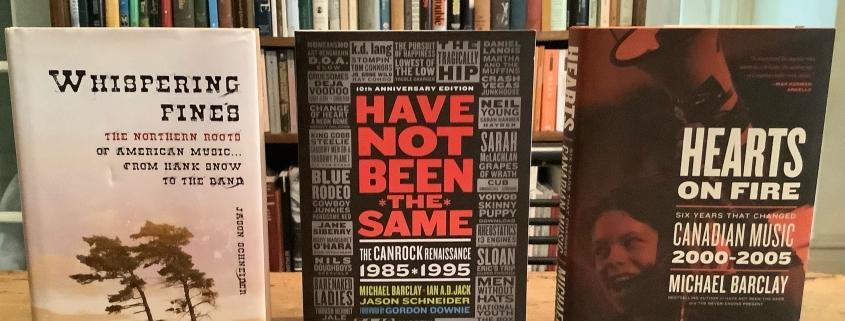
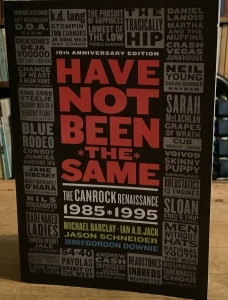
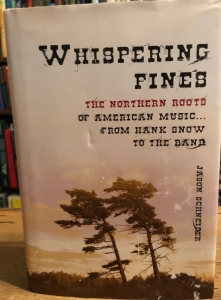
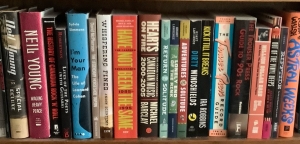

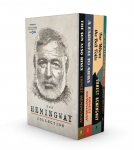
Leave a Reply
Want to join the discussion?Feel free to contribute!